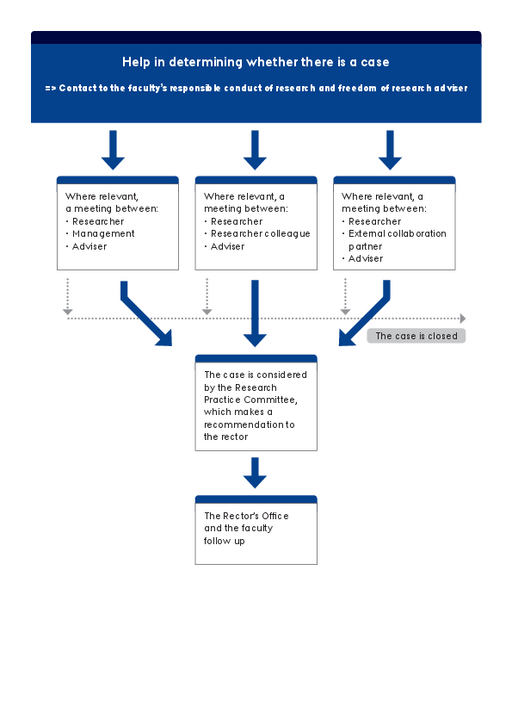Procedure for handling cases regarding pressure on freedom of research
1. Pressure on freedom of research
Employees affiliated with Aarhus University who suspect pressure on freedom of research have the option of seeking advice from the faculties’ independent responsible conduct of research and freedom of research advisers.
Examples of pressure on freedom of research include pressure exerted internally by colleagues, by managers at the university, by external partners or by funders. All employees affiliated with Aarhus University can ask for guidance from the faculties’ advisers, but only researchers affiliated with Aarhus University who experience pressure on their freedom of research can report a case.
2. Before an allegation of pressure on freedom of research is reported
Researchers affiliated with Aarhus University who are subject to pressure on their freedom of research have the option of contacting one of their faculty’s advisers. Researchers may also contact an adviser from a different faculty if they desire.
Advisers can offer confidential guidance, and are available to participate in confidential meetings between informants and the party alleged to have subjected the informant to pressure. Advisers can assist in shedding light on the facts of the case on the background of the available information.
The adviser’s role is not to take sides in the case, but rather exclusively to contribute to shedding light on the facts of the case on the background of his or her experience as a researcher.
3. How a case is reported
If the researcher does not find that a case of pressure on freedom of research has been satisfactorily resolved with the assistance of the adviser, he or she may report the case to Aarhus University’s Committee for Responsible Conduct of Research and Freedom of Research (called the Research Practice Committee). In order for the Research Practice Committee to accept a case for consideration, a prior effort to resolve the case at faculty level must have been made, and where necessary, an adviser must have attempted to contribute to resolving the case.
The researcher must submit the following information/documents:
- Information about the facts of the case constituting pressure on freedom of research
- The name of the person(s) or institution/organisation exerting pressure on freedom of research
- A description of the measures already taken to address and resolve the case
- All relevant documentation
All material must be forwarded to the Research Practice Committee secretariat by filling in the form Report a suspected breach of responsible conduct of research at AU or by contacting legal@au.dk.
The adviser may also contribute to shedding light on the case by submitting his or her account of the facts of the case and of the events of the advisory relationship with the researcher.
4. Screening and handling of the case by the Research Practice Committee
After receiving the necessary documentation, the Research Practice Committee screens the case and determines whether the committee has jurisdiction.
If the Research Practice Committee decides to consider the case, the researcher and other involved parties will be informed about the standard procedure for considering the case.
In collaboration with the chair, the Research Practice Committee secretariat ensures that the facts of the case are sufficiently clear before consideration by the committee. This may involve steps such as consultation of the involved parties or obtaining expert opinions, either from internal units at AU or externally.
When the facts of the case are sufficiently clear, a date for a meeting of the Research Practice Committee is set. The affected researcher and the other parties to the case are informed of the date of the meeting.
5. Closing a case
Once a decision has been made on the case, the Research Practice Committee submits a report to the rector. The report contains the committee’s recommendations to the rector regarding the facts of the case.
The affected researcher and the other parties to the case are informed about the Research Practice Committee’s report.
On the background of the Research Practice Committee’s recommendation, the rector decides whether additional steps are to be taken, and involves the university’s units to the relevant extent.
